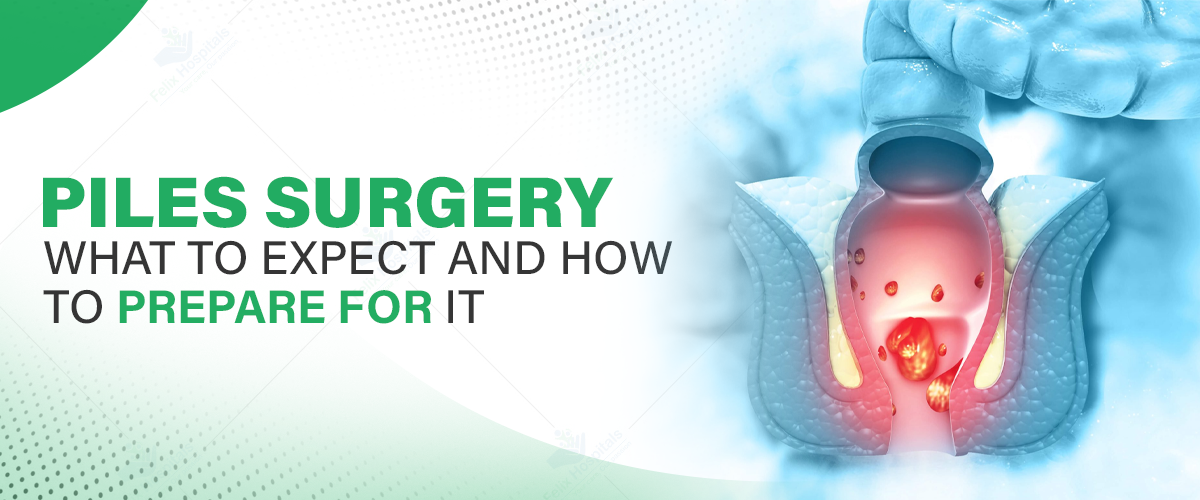
Subscribe to our

Dealing with piles, or hemorrhoids, can feel like a private battle—pain, itching, or bleeding during bowel movements isn’t something you chat about over chai. Yet, in India, 1 in 10 adults faces this discomfort, and for some, surgery becomes the best way to find relief. Piles surgery might sound daunting, but with modern techniques, it’s often quick, effective, and far less scary than you’d think. Whether you’re considering it or have a date booked, knowing what to expect and how to prepare can ease your mind and smooth your recovery. Let’s walk through the process, from getting ready to healing well, so you can face piles surgery with confidence and get back to living comfortably.
Still unsure if piles surgery is right for you? Our surgical care team is ready to answer your questions and guide you every step of the way. Call us today at +91 9667064100 and book your appointment.
Piles are swollen veins in the rectum or anus, causing pain, itching, or bleeding, especially during bowel movements. They’re common—40% of adults over 50 deal with them—and often triggered by constipation, pregnancy, or sitting too long. Mild cases respond to diet changes or creams, but severe piles (grades 3–4), affecting 15% of patients, may need surgery when they prolapse, bleed heavily, or cause constant pain. Surgery options include:
At the best hospital in Noida, the doctor can pick the best method based on your symptoms, ensuring relief tailored to you.
Preparation starts a week or two before surgery, setting you up for a smooth procedure and recovery. It’s about physical readiness and mental calm—here’s how to get there:
Your surgeon may order a blood test or enema to clear bowels, common for 20% of cases. Knowing these steps helps you feel in control.
On surgery day, you’ll likely feel a mix of nerves and relief—it’s normal! Most piles surgeries are outpatient, meaning you’re home the same day. Here’s what to expect:
Minimally invasive options, like laser, mean less pain and quicker healing, making the process smoother than you might expect.
Recovery is where patience pays off. Most people feel better in 1–2 weeks, with full healing in 4–6 weeks for traditional surgery. Here’s how to make it easier:
Follow-up visits, usually a week post-surgery, ensure healing’s on track for 85% of patients. Most return to work in 3–10 days, depending on the procedure, with the help of the best doctor for piles treatment.
Surgery fixes piles, but lifestyle changes keep them away. About 10% of patients see piles return if habits don’t shift. Try these:
Regular checkups catch issues early, keeping you comfortable long-term.
Dr. Ritesh Kumar Agrawal is the leading expert in piles (hemorrhoids) treatment in Noida at Felix Hospital. With years of hands-on experience and a compassionate, patient-focused approach, Dr. Agrawal is committed to delivering the highest standard of care to individuals suffering from piles—helping them find fast, long-lasting relief.
The cost of piles treatment can vary based on factors such as the severity of the condition, the type of treatment (medication, minimally invasive procedure, or surgery), and individual patient needs. At Felix Hospital, we provide effective and affordable piles treatment plans tailored to each case, ensuring both comfort and quality care.
Don't let piles disrupt your daily life. Schedule an appointment at Felix Hospital and explore your best treatment options—personalized just for you.
Piles surgery might feel overwhelming, but it’s a proven path to relief, with 95% of patients reporting better quality of life post-procedure. By preparing well—eating right, arranging help, and following your doctor’s plan—you set yourself up for a smooth experience. Modern techniques like laser surgery make the process quick and less painful, while recovery tips like sitz baths and fiber keep you healing strong. If piles are holding you back, don’t wait—reach out to a proctologist or general surgeon for a consultation. Take the first step toward comfort today, and let surgery help you reclaim your days, free from pain and worry.
1. Will I be able to sit normally after piles surgery, and how soon?
Ans- Yes, but you may need a donut cushion for the first few days. Most patients are comfortable sitting normally within a week, especially after laser or stapled procedures.
2. How do I know if I need piles surgery or if home remedies are enough?
Ans- If your symptoms persist despite dietary changes and topical treatments—or if you have prolapsing or bleeding piles—it’s time to consult a surgeon. Grades 3 and 4 often need surgery for long-term relief.
3. Can piles come back after surgery?
Ans- Yes, in around 10% of cases. Recurrence is usually due to lifestyle habits like chronic constipation or prolonged sitting. Following post-op advice and long-term preventive tips reduces this risk significantly.
4. Is laser piles surgery really painless?
Ans- Laser surgery is minimally invasive and causes less post-op pain compared to traditional methods. While it's not completely pain-free, most patients report mild discomfort and faster recovery.
5. How soon can I return to work after piles surgery?
Ans- Most people can return to light office work within 3–5 days after laser or stapled surgery. For traditional hemorrhoidectomy, recovery may take 7–10 days. Your doctor will guide based on your procedure and healing.
6. Are there risks of incontinence after piles surgery?
Ans- In rare cases, especially with extensive hemorrhoidectomy, mild control issues can occur, but modern techniques and experienced surgeons keep this risk under 1%. Laser and stapled methods preserve muscle integrity.
7. What if I’m diabetic or have heart issues—can I still undergo surgery?
Ans- Yes, but your condition must be well-managed. Your surgeon and anesthetist will review your medical history, adjust medications, and plan the safest approach. Many patients with chronic conditions safely undergo piles surgery.